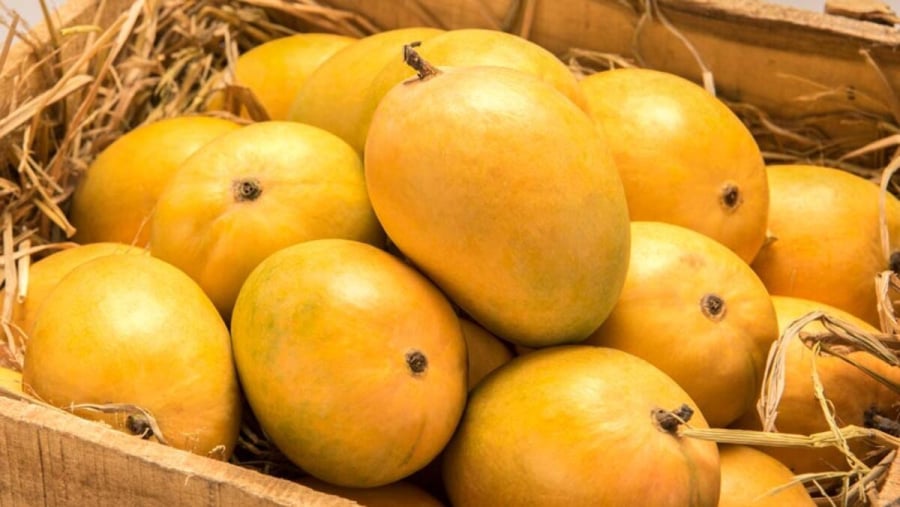People with Diabetes
Mangoes, especially ripe ones, contain a significant amount of natural sugar, which can be detrimental to people with diabetes. A 100g serving of ripe mango can contain up to 13-15g of sugar. For individuals with diabetes, consuming large amounts of mango may lead to sudden spikes in blood sugar levels, making it challenging to manage their condition. Consistent high blood sugar can result in severe complications. Therefore, people with diabetes should limit their intake of ripe mangoes and monitor their blood sugar levels before and after consumption to ensure safe consumption and determine an appropriate quantity.
Individuals with Allergies to Tree Sap or Pollen
While it is not common, there are some people who exhibit allergies to mangoes. Those with a predisposition to allergies, especially to tree sap, pollen, and particularly to plants belonging to the cashew family (Anacardiaceae), such as cashews, may experience reactions when consuming or coming into contact with mangoes. Symptoms can include itching, mouth irritation, and hives. In severe cases, it may lead to difficulty breathing and anaphylaxis. If you have previously experienced allergies to mangoes or plants from the same family, it is advisable to consume a small amount first to test for any reactions.

People with Stomach Inflammation or Acid Reflux
Unripe mangoes contain acids and are therefore not suitable for individuals with stomach-related issues. People suffering from stomach ulcers, gastritis, or acid reflux should avoid consuming unripe mangoes, especially on an empty stomach. Even ripe mangoes, when consumed in excess, can cause stomach discomfort and mild abdominal pain. If you are experiencing stomach problems, it is advisable to limit your intake of this fruit.
Individuals with Obesity or Those Trying to Lose Weight
Ripe mangoes are calorie-dense, containing approximately 150 calories per medium-sized fruit. As such, consuming large quantities of mangoes can lead to excess energy intake, hindering weight loss efforts, and being particularly unsuitable for individuals struggling with obesity or overweight issues. Additionally, the natural sugar present in mangoes can contribute to fat accumulation if consumed in the evening or in quick succession. Individuals aiming for weight loss should opt for lower-sugar fruits such as apples, guavas, or cucumbers.
People Prone to Acne and Internal Heat
According to Traditional Chinese Medicine, mangoes are considered warming in nature. Consequently, they may aggravate conditions in individuals prone to acne and internal heat. Some people experience breakouts, increased internal heat, and throat dryness after consuming large amounts of mangoes. Instead of mangoes, individuals with these concerns should opt for cooling foods such as leafy greens and winter melons.
Infants Under One Year Old
Infants under the age of one should not consume large amounts of mangoes. Early introduction of mangoes may lead to diarrhea, stomach discomfort, or allergies. It is recommended to introduce milder, easily digestible fruits such as bananas and steamed pears to infants under one year old. Mangoes can be introduced after the child reaches 12 months of age, and even then, it is advisable to start with small quantities to monitor for any allergic reactions.
Individuals Taking Antibiotics or Undergoing Liver Treatment
Mangoes may interact with certain medications, especially those used for liver treatment, antibiotics, or anti-inflammatory drugs. Mango consumption during medication may reduce the effectiveness of the drugs and potentially harm the liver. Therefore, it is advisable to refrain from eating mangoes while undergoing treatment or taking specific medications.
Breakfast Like This for 3 Weeks: Slim Waist, Beautiful Figure – No Dieting Needed, Diverse Daily Menu
No strict dieting or morning fasting is required to effectively reduce belly fat; choosing the right breakfast menu will get you there. With the following 21 diverse, easy-to-cook, and non-boring breakfast options, you’ll noticeably feel lighter, more energized, and slimmer around the waist in just 3 weeks.
Black Bean Water and Its 5 Outstanding Health Benefits That You Shouldn’t Miss
Discover the Surprising Benefits of Black Bean Water: 5 Reasons to Drink Up!
Uncover the amazing advantages of this simple beverage – from cooling your body, promoting healthy skin, aiding weight loss, and supporting heart health. A true powerhouse drink that delivers a big boost to your well-being!





































